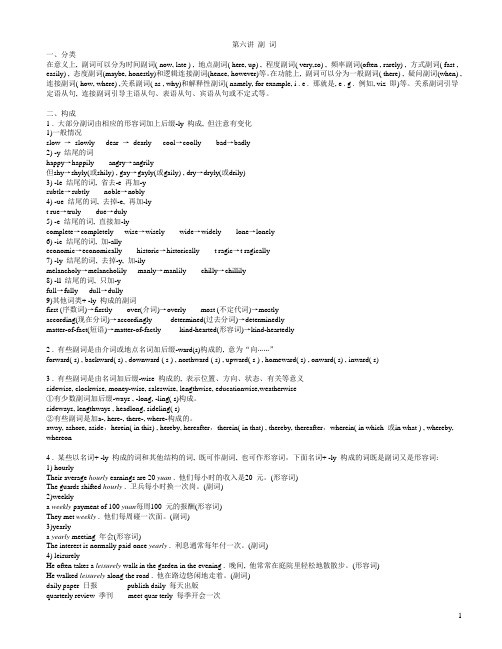副词大学英语语法之副词初高中语法
- 格式:ppt
- 大小:1.05 MB
- 文档页数:33

副词(英语副词)—搜狗百科展开全文1) close与closelyclose意思是'近'; closely 意思是'仔细地'He is sitting close to me.Watch him closely.2) late 与latelylate意思是'晚'; lately 意思是'最近'You have come too late.What have you been doing lately?3) deep与deeplydeep意思是'深',表示空间深度;deeply时常表示感情上的深度,'深深地'He pushed the stick deep into the mud.Even father was deeply moved by the film.4) high与highlyhigh表示空间高度;highly表示程度,相当于muchThe plane was flying high.I think highly of your opinion.5) wide与widelywide表示空间宽度;widely意思是'广泛地','在许多地方'He opened the door wide.English is widely used in the world.6) free与freelyfree的意思是'免费';freely 的意思是'无限制地'You can eat free in my restaurant whenever you like.You may speak freely; say what you like.副词有加a或ly的区别在于通常加a 的副词描述一种状态,而加ly 的副词则倾向于感觉。
英语中,有些副词具有两种形式:一是与形容词同形;二是由该形容词后加-ly构成(以下称形容词形副词和-ly形副词)。

高考英语副词语法知识一、概念副词和形容词一样,也有原级、比较级和最高级三个等级。
其构成方式有规则变化和不规则变化两种情况。
规则变化的一般规律是:单音节词的比较级和最高级在词尾加-er或-est;多音节词以及-ly结尾的副词(early 除外),前面加more或most。
不规则的变化式只能采用“各个击破”的办法去记忆。
⒈规则变化如:2.不规则变化例如:二、副间的比较级的用法⒈单独使用如:Try to do better next time.下次争取干好一点。
He'lI come back sooner or later.他迟早会回来的。
Please speak more slowly.请讲慢一点。
⒉和than一起使用如:He swims better than I do.他游泳游得比我好。
Can you do any better than that.你能不能干的好一些?He arrived earlier than usual.他到的比平时早。
⒊比较级前可有状语修饰如:You must work much faster.你必须大大加快干活的速度。
Can you come over a bit more quickly?你能稍稍快点来吗?⒋ as…as和not so…as结构这两个结构也可结合副词使用① as…as可用在肯定句中,表示“像……一样",后面的副词要用原级。
如:She can run as fast as a deer.她能跑的像鹿一样快。
②在否定句中,as…as和so…as都可以用。
例如:I don't go there as much as I use.我现在到那里不象过去那么多了。
I didn't do as(so)well as I should.我做的不如我应做的那么好。
③这种句子中也可以有一个表示程度的状语。
例如:She can read twice as fast as he does.她阅读的速度比他快一倍。

英语中副词及用法规律总结副词是一类修饰动词、形容词、其他副词或整个句子的词语。
它能够增加句子的细节和描述,使文章更加生动有趣。
在英语中,副词的种类繁多,使用方法也有一定的规律和规则。
下面是对主要的副词及其用法规律的总结。
1. 副词的分类副词可以分为不同的类别,主要包括:(1) 方式副词(Adverbs of Manner):表示动作的方式,如:quickly(迅速地)、carefully(小心地)等。
(2) 时间副词(Adverbs of Time):表示动作的时间,如:yesterday(昨天)、soon(很快地)等。
(3) 地点副词(Adverbs of Place):表示动作的地点,如:here (这里)、there(那里)等。
(4) 程度副词(Adverbs of Degree):表示动作或形容词的程度,如:very(非常)、too(太)等。
(5) 频率副词(Adverbs of Frequency):表示动作的频率,如:always(总是)、often(经常)等。
(6) 疑问副词(Interrogative Adverbs):用于提问,如:how(如何)、when(何时)等。
(7) 连接副词(Conjunctive Adverbs):用于连接句子,如:however(然而)、therefore(因此)等。
2. 副词的用法规律(1) 修饰动词:副词可以用来修饰动词,描述动作的方式、时间、地点等,如:He runs quickly(他跑得快)。
(2) 修饰形容词:副词可以用来修饰形容词,表示形容词的程度,如:It's very hot(非常热)。
(3) 修饰其他副词:副词可以用来修饰其他副词,表示程度、方式等,如:He speaks very fluently(他说得非常流利)。
(4) 修饰整个句子:副词可以用来修饰整个句子,表示说话者的观点、态度等,如:Certainly, I will help you(当然,我会帮助你)。

副词知识点用法总结归纳一、副词的定义和分类1. 副词的定义:在英语中,副词是一种用来修饰动词、形容词、副词或整个句子的词类,用于表示时间、地点、方式、程度等含义。
2. 副词的分类:根据其所修饰的词类和表示的含义,副词可以分为以下几类:(1)时间副词:表示时间的副词,如now(现在)、today(今天)、yesterday(昨天)、soon(很快)、always(总是)等。
(2)地点副词:表示地点的副词,如here(这里)、there(那里)、above(在上面)、below(在下面)、everywhere(到处)等。
(3)方式副词:表示方式的副词,如quickly(快速地)、carefully(小心地)、easily(容易地)、well(好)等。
(4)程度副词:表示程度的副词,如very(非常)、extremely(极其)、rather(相当)、too(太)等。
(5)疑问副词:表示疑问的副词,如where(哪里)、when(什么时候)、how(怎样)、why(为什么)等。
二、副词的用法1. 修饰动词:副词可以用来修饰动词,表示动作的时间、地点、方式或程度。
例如:He runs quickly.(他跑得快。
)(修饰动词)2. 修饰形容词:副词可以用来修饰形容词,表示形容词描述的程度。
例如:She is very beautiful.(她非常漂亮。
)(修饰形容词)3. 修饰副词:副词可以用来修饰其他副词,表示副词描述的程度或方式。
例如:He speaks English quite fluently.(他的英语说得非常流利。
)(修饰副词)4. 修饰整个句子:副词可以用来修饰整个句子,表示说话人的态度、观点或希望。
例如:Hopefully, we will win the game.(希望我们能赢得比赛。
)(修饰整个句子)三、副词的比较级和最高级1. 比较级的构成:一般情况下,比较级的构成方式是在副词前面加上more或者在副词后面加上-er。

第六讲副词一、分类在意义上, 副词可以分为时间副词( now, late ) , 地点副词( here, up) , 程度副词( very,so) , 频率副词(often , rarely) , 方式副词( fast , easily) , 态度副词(maybe, honestly)和逻辑连接副词(hence, however)等。
在功能上, 副词可以分为一般副词( there) , 疑问副词(when) , 连接副词( how, where) ,关系副词( as , why)和解释性副词( namely, for example, i . e . 那就是, e . g . 例如, viz 即)等。
关系副词引导定语从句, 连接副词引导主语从句、表语从句、宾语从句或不定式等。
二、构成1 . 大部分副词由相应的形容词加上后缀-ly 构成, 但注意有变化1)一般情况slow →slowly dear →dearly cool→coolly bad→badly2) -y 结尾的词happy→happily angry→angrily但shy→shyly(或shily) , gay→gayly(或gaily) , dry→dryly(或drily)3) -le 结尾的词, 省去-e 再加-ysubtle→subtly noble→nobly4) -ue 结尾的词, 去掉-e, 再加-lyt rue→truly due→duly5) -e 结尾的词, 直接加-lycomplete→completely wise→wisely wide→widely lone→lonely6) -ic 结尾的词, 加-allyeconomic→economically historic→historically t ragic→t ragically7) -ly 结尾的词, 去掉-y, 加-ilymelancholy→melancholily manly→manlily chilly→chillily8) -ll 结尾的词, 只加-yfull→fully dull→dully9)其他词类+ -ly 构成的副词first (序数词)→firstly over(介词)→overly most (不定代词)→mostlyaccording(现在分词)→accordingly determined(过去分词)→determinedlymatter-of-fact(短语)→matter-of-factly kind-hearted(形容词)→kind-heartedly2 . 有些副词是由介词或地点名词加后缀-ward(s)构成的, 意为“向⋯⋯”forward( s) , backward( s) , downward ( s ) , northward ( s) , upward( s ) , homeward( s) , onward( s) , inward( s)3 . 有些副词是由名词加后缀-wise 构成的, 表示位置、方向、状态、有关等意义sidewise, clockwise, money-wise, saleswise, lengthwise, educationwise,weatherwise①有少数副词加后缀-ways , -long, -ling( s)构成。

按照属性分类
时间副词,表示时间或频率
地点副词,表示地点或位置
方式副词,表示行为方式
程度副词,表示动作程度
疑问副词,引导特殊疑问句
强调副词,强调形容词或动词
连接副词,引导主语从句宾语从句表语从句或者并列结构
关系副词,引导定语从句
句子副词,修饰句子
以ly结尾的副词,大多数时候形容词+ly等于副词
大部分以y结尾变成副词,变y为i加ly
wards、wise结尾的副词
本身ly结尾的形容词,不能变成副词或者长一样
形容词和副词一样的
本身就是副词,不是形容词变的
副词比较级变化,规则跟形容词比较级一样,形容词比较级特殊结构副词一样能用
副词放置位置Why
angrily
hard
副词可以做的句子成分
too、also、either、nor
too、also、either、nor
sometimes、sometime、some times、some time
sometimes、sometime、some times、some time
farther、further
farther、further
most、mostly
most、mostly。
高中英语语法专题副词与必背短语高中英语语法专题副词一、概念副词(Adverb 简称adv.)是指在句子中表示行为或状态特征的词,用以修饰动词、形容词、副词本身的词。
①副词修饰动词 He runs fast. 他跑得很快。
②副词修饰形容词 He is very clever. 他很聪明。
③副词修饰副词 I can dance very well. 我跳舞跳得不错。
二、副词分类时间副词(today,ago)、地点副词(here,upstairs)、程度副词(very,so)、方式副词(fast,loudly) 、疑问副词(when,how)、关系副词(when,where等常用来引导定语从句)、频率副词(often,never). 需要注意副词在句子中的位置,表示地点、时间、方式的副词通常放在句末,而频率副词和程度副词通常放在助动词后,实义动词前,即“助后动前”。
三、形容变副词1. 形容词词尾加ly 例如:loud-loudly slow-slowly2. 形容词以辅音字母加y结尾,去掉y变i加ly 例如:heavy-heavily happy-happily3. 部分形容词以e结尾,去掉e再加ly 例如:whole-wholly true-truly4. 特殊变化例如:good-well5. 形容词副词同形例如:late-late hard-hard fast-fast四、副词在句子中的成分1. 副词作状语例如:She studies hard.她学习很用功(hard作方式状语修饰动词study)2. 副词作定语例如:He likes the pictures there. 他喜欢那儿的图画.(there修饰pictures作定语)3. 副词作表语例如:I’m home.我到家了。
(home作为地点副词,在这里是主系表结构中的表语)4. 副词作宾语补足语例如:I saw the light on last night.昨天晚上我看见灯亮着。
六、形容词和副词(二)【副词是用以修饰动词、形容词、其它副词或全句的词,表示时间、地点、程度、方式等概念。
】1、副词的语法功能1)作状语,起修饰作用 They are warmly received upon arrival.2)作表语,表主语的方向、方位、动作 The light is still on . 3)作定语,表示时间和地点 Is there a post office here .4)作补足语,说明主语所处的位置、状态等 The little was kept indoors all by herself when her parents went to work.2、副词的特征1)以ly 结尾的副词 frequently constantly rapidly calmly happily anxiously 2)与形容词同形的副词 late firm fast low high early long slow3)有些词本身是副词,在加ly 后又构成另外的副词,两种副词的意义有联系也有区别【形容词加ly 变副词的规律】直接加后缀 careful-carefully; quick-quickly; safe-safely; slow-slowly以le 结尾的,去e 加y gentle-gently; possible-possibly; comfortable-comfortably以y 结尾的双音节形容词,把y 变i ,再加ly easy-easily; happy-happily; heavy-heavily shy 的副词形式是shyly.【原型副词一般表示的是具体意义,加ly 的副词往往具有比喻意义,表示程度】 The picture is hanging high in the back wall. Playing with fire is highly dangerous.【有些副词与加ly 的副词在修饰动词时基本相同】 The little held her mother's hand firmly/firm .Mr. Black's mistake cost him dearly/dear 损失惨重.hard 努力地 high 高deep 深深地 late 迟、晚 free 免费地 just 正好hardly 几乎不 highly 非常 deeply 强烈地 lately 最近、近来 freely 自由地 justly 公正地near 附近 most 最 wide 张大地 close 靠近 loud 响亮地 clean 完全的nearly 几乎mostly 几乎全部 widely 广泛地 closely 密切地 loudly 大声地 cleanly 干净的3、副词的分类及其位置1)时间副词now; recently; right away; soon; since; then; now and then; today; age; just now; right then; tomorrow; late 位置:一般放在句末,有时也放在动词前面Will you be free tonight?On receiving his letter, I immediately wrote back.2)地点副词here; upstairs; far; outdoors; there; downstairs; overhead; indoors; abroad; ashore; everywhere; away位置:一般位于所修饰的动词后面,偶尔也可放于句首,尤其是here/thereThey moved downtown.We should always walk outdoors for fresh air.Here you can find whatever kind of book you want.3)方式副词angrily; carefully; simply; beautifully; slowly; kindly; calmly; suddenly; openly;位置:动词前后和第一助动词后和句末Mary coughed miserably. She had been ill for a long time.The spokesman publicly declared that he didn't know anything about the matter forehand.These countries were ruthlessly invaded.He gave a speech openly.4)程度副词much; awfully非常; very; partly; fully; extremely; entirely; dearly;非常地; almost; truly; rather; nearly; half;quite位置:修饰形容词副词时放在其前,修饰动词时放在第一个助动词后,实义动词前Different people have different backgrounds and habits. Everyone behaves somewhat differently都有点不同.You are such a likable person. I greatly enjoy working with you5)频度副词usually; often; sometimes; never; always; regularly; constantly; frequently; seldom位置:比较灵活,可位于句首、句末、第一助动词后、动词前Bruce is constantly changing his mind.His wife goes shopping frequently on weekends.Usually our new term starts in September.She never saw him again.6)疑问副词where; when; why; how7)关系副词where; when; why8)连接副词therefore; moreover; besides; however; otherwise; then; meanwhile; when; where; why; whenever; wherever; however位置:两个句子中间,谓语前,句尾Sales have been good, yet profits are low.I'd like to go with you. My hands, however, are full.We do not have enough money. We cannot afford to buy the new car, therefore.9)句子副词frankly; evidently; luckily; unfortunately; hopefully; surprisingly。